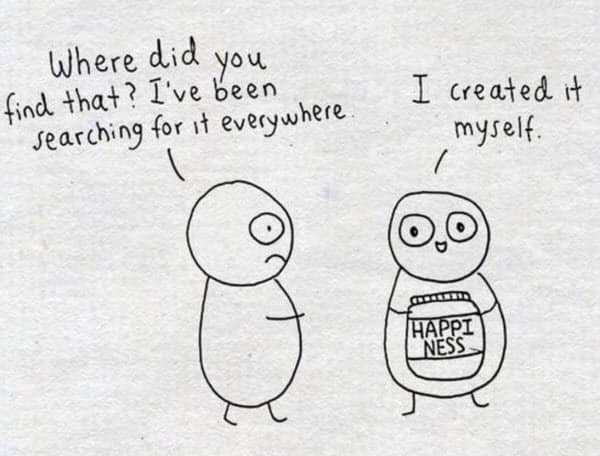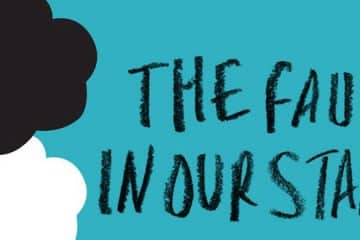What Is Happiness?
It seems a little bit strange question, doesn’t it? You may be wondering: “Why do I need to know the formal definition if I can feel the presence of happiness?” We indeed use this word to describe a wide range of positive emotions: from comfort to euphoria. But we can’t really address the notion or talk about it if we don’t know what we are talking about, so let’s get this straight.
Oxford English Dictionary defines “happiness” as “the state of being happy.” Well, that’s not very helpful, is it? But if we click on the adjective “happy” we will see that it is explained as “Feeling or showing pleasure or contentment.”

Therefore, probably the most practical, but, of course, not exhaustive definition would be: “Happiness is a state of feeling or showing pleasure or contentment”.
What conclusions can be drawn?
- Happiness is not a long-lasting phenomenon or a permanent characteristic of a person. It is a temporary state.
- You feel and show, so it is both an internal and external experience.
- Happiness is related to contentment and pleasure, therefore, one should not confuse it with the term “joy”.
Surely, this definition is merely a drop in the bucket, due to the complexity of the concept. If we look at this term through psychological or scientific lenses, new aspects and nuances will be revealed. If you want to go deeper into this topic, watch this video:
The Difference Between Happiness and Joy
We have mentioned that “happiness” differs from “joy”. In what way? Let’s take a closer look!
| Happiness | Joy |
| “an inch deep and a mile wide”; | “a mile deep and a mile wide”; |
| has a self-centered element and an individual focus; | can bubble up and overwhelm you – therefore, perceived as more intense; |
| feels a little bit vague – it is hard to know in a given moment whether we are happy or not; | when we experience it, we do not doubt it; |
| requires some self-reflection; | doesn’t require self-reflection – its nature is simpler; |
| implies a broad evaluation of our life quality and a cognitive appraisal of how we feel about our work, relationships, social connections, etc. | implies an emotional response to the moment. |
Why Is It Important to Feel Happy?
What are the benefits? Are there any real advantages or are we just chasing the idea of happiness that we have somehow decided was good? We will enumerate some facts and you will see for yourself!
- Happiness tends to lead to success in a lot of different areas because it is related to things like confidence, optimism, sociability, coping with challenges, creativity, and physical health. These key connections can mean greater successes down the line.
- If you are happy, you will have rapid progress in your career. People with a greater sense of well-being are more likely to secure job interviews, to be evaluated more positively by supervisors once they obtain a job, to show superior performance and productivity, and to handle managerial jobs better. These people are also more likely to graduate college, to get better jobs, and to be more satisfied with those jobs.
- Many studies have now shown that the happier person is, the more friendships her or she has. And it’s not just friends – they’re people who offer true social support and whom they can rely on. Really good, high-quality social connections. It also turns out to be the case that happier people tend to be less jealous of others, and they tend to report feeling less lonely than unhappy people.
- Happier people report feeling physically better and experiencing less pain than unhappy people. They’re also less likely to engage in harmful, unhealthy behaviors like smoking, eating high-calorie diets, and abusing drugs and alcohol.
In fact, one study exposed healthy volunteers to a rhinovirus, which is the cause of the common cold. The researchers monitored participants to see how they reacted to the virus. The results showed that whether or not these participants actually developed a cold depended on their general happiness. The more people had a positive emotional style, the less likely they were to actually develop a cold, which suggests that positive emotions are somehow associated with a healthier immune system.

What Stops You From Being Happy
The pursuit of happiness is a lifelong endeavor and everyone struggles to feel happy at certain points in their lives. You may yearn for success, admiration, and friendships, because it may lead to emotional fulfillment, but oftentimes you may need to overcome feelings of insecurity, loneliness, or regret before you can allow yourself to be happy. Let’s consider some possible reasons why you may feel depressed.
- You worry about everything. Do you worry about what other people think of you or what might go wrong today? Worrying too much can cause you a great deal of emotional distress, especially if it’s completely out of your control.
- You hold on to grudges. Do you struggle to forgive and forget even with the people you love? While it’s normal to be frustrated and upset sometimes, it’s never good to dwell too much on your anger.
- You compare yourself to others. Do you feel down when you’re reminded of someone else’s attractiveness, popularity, or success? That’s where your insecurities may come from.
- You’ve forgotten how to be grateful. When was the last time you felt thankful for what you have, whether it’s getting good sleep, eating delicious food, or spending time with your loved ones? The kind of negative attitude of being ungrateful or complaining about the things you don’t have will likely fuel your unhappiness even more.
- You have a pessimistic way of thinking. Do you have a bad habit of looking at the downside of everything? Do you often criticize yourself and downplay your own achievements? Happiness is a choice. Don’t ruin it by choosing to focus on far-fetched problems.
- You’re surrounded by negative people. Negativity is contagious. And happiness is only real when shared.
- You’ve given up control of your life. Is there something or someone you’ve been blaming your unhappiness on? When you blame others for your troubles, you may feel helpless to turn your life around for the better.
Wrong Place To Look For Happiness
Most of us often think: “If I just had a new car, a higher salary, a bigger house, a more loving partner, I would be so much happier”. But the research says, that of course there is a boost with a new car and a new marriage, but after some time – with the car, this might be a few months and the generally accepted time with the marriage is about two years – the new becomes the norm and our happiness quotient drops back to what it was. The fancy name for this is “hedonic adaptation”. The observation is that happiness doesn’t come from getting something we don’t have, but rather from recognizing and appreciating what we do have. Basically, happiness is wanting what you have.
So, don’t look for it in external circumstances. Happiness comes from within.

10 Ways To Find Happiness In Everyday Life
There are plenty of people around the world who live in third world countries with nothing more than the shirts on their back. And yet, often these are the happiest people on earth. This illustrates how you don’t need much to be happy.
So, what is their secret? How can you boost your happiness to sky-high levels? Funnily enough, there are plenty of tips and tricks which have been proven to work wonders.
- Spend money on others. When many of us are sad, we often go out and buy something in an effort to cheer ourselves up. But, a stunning study from 2008 has shown that if you really want to use the money to increase your happiness you need to spend it on other people.
- Listen to sad songs. When you are feeling blue, put in your headphones and play the saddest songs in your playlist. You will receive beneficial emotional effects, included regulation of negative emotions and mood.
- Drink coffee. One of the studies found that 1 cup of coffee per day equated to an 8% decrease in the risk of depression. It might have something to with Antioxidants present in coffee, as well as its link to Dopamine-Production.
- Meditate – it reduces stress and anxiety, and evokes feelings of peace, love, and happiness.
- Go for a walk. Sometimes the simplest methods are often the most effective. The positive effects of simply getting outside and experiencing nature on our mental health are obvious.
- Get your feelings off of your chest. Keeping your emotions bottled up inside of you is never a good idea. One recent study looked at how recording a negative emotional experience can help us deal with our worries. Those who were writing about their emotional experiences were much calmer than those who were writing about other subjects. Our ultimate guide for beginners on how to write a reflective essay will definitely come in handy here!
- Watch the sunrise. Witnessing a sunrise opens your eyes to the complexity of the natural world, which is as uplifting as it is humbling. It can give you hope.
- Cleanse your environment. Excess clutter is actually one of the most common mental and emotional stressors.
- Сut down on social media or just take a break from it completely.
- Try a new hobby. Simply pushing yourself to navigate through uncharted territory increases your confidence and self-esteem.
The Greatest Happiness Principle
John Stuart Mill, a prominent philosopher of the 19th century, developed a theory, according to which right action is one that increases happiness or decreases paying in the end. He called it the Greatest Happiness Principle. It provides us with a way of thinking that can maximize our well-being to the fullest if one can properly apply it to real life. By the word “happiness” Mill meant “pleasure and the absence of pain”. To live in compliance with this principle means avoiding doing something that will hurt us and favor actions that will produce enjoyment.
How To Write an Essay on Happiness
Among a great variety of topics to write about, an essay on happiness holds top positions. This might seem an easy one, but still, there are some important rules to remember.
As for structure, you may use a traditional three-component structure, which includes an introduction, a main body, and a conclusion.
When writing an introduction, present your topic in an interesting and gripping way so that your readers could understand what they are going to read about and get involved. You are free to use quotes and other additional sources.
Next comes the main body. First of all, express your main thought and deliver your core message to the audience. Keep it short – no more than three sentences. In the following paragraphs, support and develop your central idea. The number of paragraphs may vary from three to five.
Finally, you proceed to your conclusion. Do not introduce new thoughts here – just make a concise summary.
Do not concentrate on form too much – content matters more. If you are sharing your views on happiness with others, then it is crucial for you to define what it means to you. Try to think of things that make you feel happy. A tasty cake, a crazy party, or maybe a spontaneous trip to the other town? Fine! Add it to your essay to make it more personal.

To sum it all up, happiness is something that is difficult to describe with words. It is an essential element of our existence. Without our ability to feel it, reality would seem too gloomy and distressing. And it takes only you to decide whether you are happy or not. Not your environment, friends, partners, parents. You. So find your own way to this feeling and live your life to the fullest!
Answers to some popular questions
Why does happiness come from within?
Happiness is our inside job. We choose to be happy, not the circumstances we live in.
What is the Greatest Happiness Principle?
The Greatest Happiness Principle implies that the right action is one that increases happiness or decreases paying in the end. It was developed by John Stuart Mill.
What is the difference between happiness and joy?
Happiness requires some self-examination. It may be hard to define whether we feel it in a particular moment or not. Joy, in turn, is just an emotional immediate response to the moment.
What is happiness?
This word describes a wide range of positive emotions, it is hard to define it for sure. It may be perceived as a state of contentment with your own life.
Does happiness come from helping others?
Of course! There are many things that people feel happy about. If helping others works for you – go for it!






Quite interesting and unusual content on the topic of happiness and where to find it, I always find happiness in simple things, such as an evening walk after a hard day at work, rest and watching TV shows, I am also inspired by what I do, my work motivates me and gives I have strength In fact, it is very difficult to know exactly where your happiness is, where it comes from, but if you find it (the source), half of the things in the world are already done)))
What is happiness? An eternal question – which forever remains unanswered, but a person will always look for an answer to it. This answer is different for everyone, so there is no definitive formula. Listen to your sensations and feelings when you do something, when you feel good and like everything, this is probably happiness!